Real Estate Development
房地产开发公司英语口语惯用语
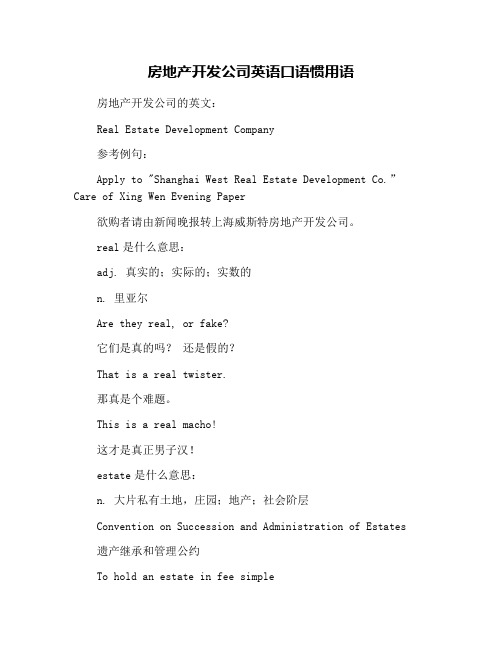
房地产开发公司英语口语惯用语房地产开发公司的英文:
Real Estate Development Company
参考例句:
Apply to "Shanghai West Real Estate Development Co.” Care of Xing Wen Evening Paper
欲购者请由新闻晚报转上海威斯特房地产开发公司。
real是什么意思:
adj. 真实的;实际的;实数的
n. 里亚尔
Are they real, or fake?
它们是真的吗?还是假的?
That is a real twister.
那真是个难题。
This is a real macho!
这才是真正男子汉!
estate是什么意思:
n. 大片私有土地,庄园;地产;社会阶层
Convention on Succession and Administration of Estates
遗产继承和管理公约
To hold an estate in fee simple
持有无限制的完全保有土地所有权的地产
Certain estates are labelled as undesirable.
某些物业被归入不受欢迎之列。
development是什么意思:
n. 发展,扩展;发育;研制,开发;进展;新建住宅区,开发区development parameter
发展参数;发展规范
development of gas
放出气体;放出毒气
Coordinate economic development with social development 把经济发展和社会发展结合起来。
房地产企业开发成本审计流程
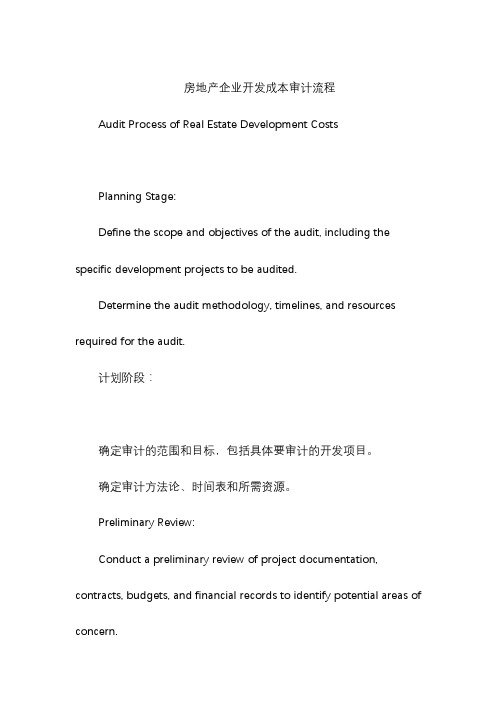
房地产企业开发成本审计流程Audit Process of Real Estate Development CostsPlanning Stage:Define the scope and objectives of the audit, including the specific development projects to be audited.Determine the audit methodology, timelines, and resources required for the audit.计划阶段:确定审计的范围和目标,包括具体要审计的开发项目。
确定审计方法论、时间表和所需资源。
Preliminary Review:Conduct a preliminary review of project documentation, contracts, budgets, and financial records to identify potential areas of concern.Assess the adequacy of internal controls and risk management practices related to development cost management.初步审查:对项目文件、合同、预算和财务记录进行初步审查,以确定潜在的问题领域。
评估与开发成本管理相关的内部控制和风险管理实践的适当性。
Fieldwork:Perform detailed testing and analysis of development cost transactions, including expenditures on land acquisition, construction, labor, materials, and overheads.Verify the accuracy and completeness of cost data by reconciling financial records with supporting documentation.实地工作:对开发成本交易进行详细的测试和分析,包括土地收购、建设、劳动、材料和间接费用支出。
《房地产开发经营与管理》课程教学大纲
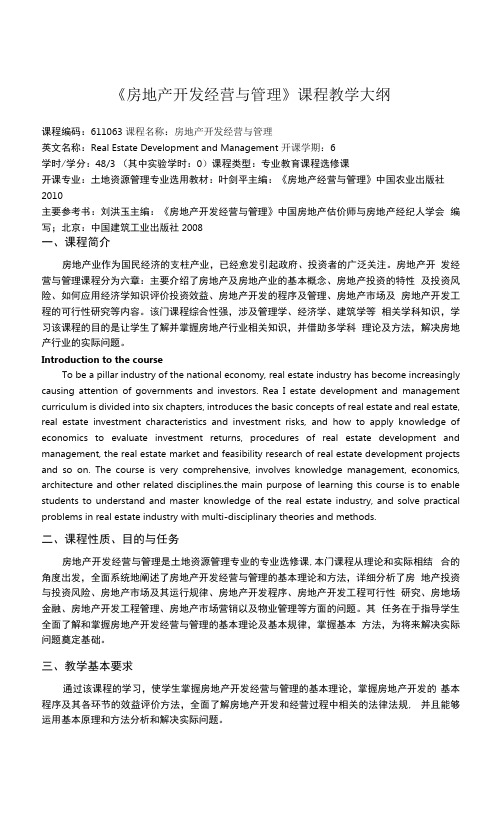
《房地产开发经营与管理》课程教学大纲课程编码:611063课程名称:房地产开发经营与管理英文名称:Real Estate Development and Management开课学期:6学时/学分:48/3 (其中实验学时:0)课程类型:专业教育课程选修课开课专业:土地资源管理专业选用教材:叶剑平主编:《房地产经营与管理》中国农业出版社2010主要参考书:刘洪玉主编:《房地产开发经营与管理》中国房地产估价师与房地产经纪人学会编写;北京:中国建筑工业出版社2008一、课程简介房地产业作为国民经济的支柱产业,已经愈发引起政府、投资者的广泛关注。
房地产开发经营与管理课程分为六章:主要介绍了房地产及房地产业的基本概念、房地产投资的特性及投资风险、如何应用经济学知识评价投资效益、房地产开发的程序及管理、房地产市场及房地产开发工程的可行性研究等内容。
该门课程综合性强,涉及管理学、经济学、建筑学等相关学科知识,学习该课程的目的是让学生了解并掌握房地产行业相关知识,并借助多学科理论及方法,解决房地产行业的实际问题。
Introduction to the courseTo be a pillar industry of the national economy, real estate industry has become increasingly causing attention of governments and investors. Rea I estate development and management curriculum is divided into six chapters, introduces the basic concepts of real estate and real estate, real estate investment characteristics and investment risks, and how to apply knowledge of economics to evaluate investment returns, procedures of real estate development and management, the real estate market and feasibility research of real estate development projects and so on. The course is very comprehensive, involves knowledge management, economics, architecture and other related disciplines.the main purpose of learning this course is to enable students to understand and master knowledge of the real estate industry, and solve practical problems in real estate industry with multi-disciplinary theories and methods.二、课程性质、目的与任务房地产开发经营与管理是土地资源管理专业的专业选修课,本门课程从理论和实际相结合的角度出发,全面系统地阐述了房地产开发经营与管理的基本理论和方法,详细分析了房地产投资与投资风险、房地产市场及其运行规律、房地产开发程序、房地产开发工程可行性研究、房地场金融、房地产开发工程管理、房地产市场营销以及物业管理等方面的问题。
房地产英文
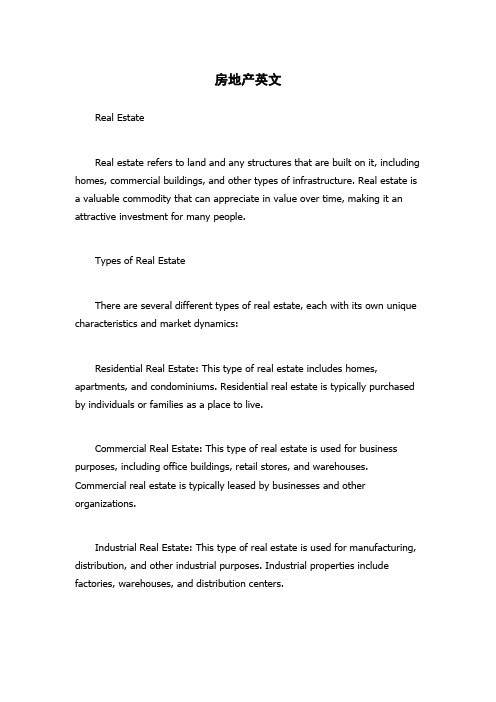
房地产英文Real EstateReal estate refers to land and any structures that are built on it, including homes, commercial buildings, and other types of infrastructure. Real estate is a valuable commodity that can appreciate in value over time, making it an attractive investment for many people.Types of Real EstateThere are several different types of real estate, each with its own unique characteristics and market dynamics:Residential Real Estate: This type of real estate includes homes, apartments, and condominiums. Residential real estate is typically purchased by individuals or families as a place to live.Commercial Real Estate: This type of real estate is used for business purposes, including office buildings, retail stores, and warehouses. Commercial real estate is typically leased by businesses and other organizations.Industrial Real Estate: This type of real estate is used for manufacturing, distribution, and other industrial purposes. Industrial properties include factories, warehouses, and distribution centers.Land: Land refers to undeveloped property that has not been built on or improved in any way. Land can be used for a variety of purposes, including agriculture, recreation, and development.Real Estate DevelopmentReal estate development involves the acquisition, construction, and sale or lease of real estate. Developers may work on projects ranging from single-family homes to large commercial and industrial properties.Some of the key steps in real estate development include:Land Acquisition: Developers must identify and purchase suitable land for their projects. This may involve negotiating with landowners, obtaining zoning and planning approvals, and conducting environmental assessments.Design and Planning: Once land is acquired, developers must work with architects, engineers, and other professionals to design the project and obtain necessary approvals from local government agencies.Construction: The construction phase involves building the project according to the approved plans and specifications. This may involve hiring contractors and coordinating with vendors.Marketing and Sales/Leasing: Once the project is complete, developers must market and sell or lease the property. This may involve placing advertisements, working with real estate agents, and conducting open houses.Real Estate InvestingReal estate investing involves the purchase and ownership of real estate assets for the purpose of generating income and/or appreciation. There are several different ways to invest in real estate, including:Rental Properties: Many real estate investors purchase residential or commercial properties and rent them out to tenants. Rental income can provide a steady stream of cash flow, while property values appreciate over time.Real Estate Investment Trusts (REITs): REITs are companies that own and manage income-producing real estate properties. Investors can buy shares in a REIT, providing them with exposure to real estate without the hassle of owning and managing properties directly.Flipping Houses: Some investors buy distressed properties at a discount, renovate them, and then sell them for a profit. This strategy can be risky, as it involves taking on significant debt and requires a solid understanding of the real estate market.Real Estate Crowdfunding: Crowdfunding platforms allow individual investors to pool their money together to invest in real estate projects. This can provide access to a wider range of investment opportunities, but investors should still do their due diligence before investing.ConclusionReal estate is a complex and dynamic asset class that offers a wide range of investment opportunities. Whether you're looking to buy a home, invest in rental properties, or participate in a real estate crowdfunding campaign, it's important to understand the market dynamics and risks involved. With the right knowledge and approach, real estate can be a lucrative and rewarding investment.。
房地产相关文献综述范文

房地产相关文献综述范文English Answer:Real Estate Literature Review.Real estate is a vast and complex field, with a wide range of topics that have been studied by researchers. This literature review provides an overview of some of the key areas of research in real estate, including:Real estate markets: The real estate market is a complex system that is influenced by a variety of factors, including economic conditions, interest rates, and government policies. Researchers have studied the dynamics of real estate markets to understand how they operate and how they can be affected by changes in the economy.Real estate investment: Real estate is a popular investment vehicle, and researchers have studied thefactors that affect the performance of real estateinvestments. These factors include the location of the property, the type of property, and the investment strategy used.Real estate development: Real estate development is a complex process that involves the planning, design, and construction of new properties. Researchers have studied the factors that affect the success of real estate development projects, including the market demand for new properties, the cost of development, and the regulatory environment.Real estate finance: Real estate finance is a complex area of study that involves the financing of real estate investments. Researchers have studied the different types of real estate融资, such as mortgages, equity financing, and mezzanine financing. They have also studied the factors that affect the cost of real estate financing, such as the interest rate, the loan-to-value ratio, and the creditworthiness of the borrower.These are just a few of the key areas of research inreal estate. The field of real estate is constantly evolving, and new research is being conducted all the time. This literature review provides a brief overview of some of the most important areas of research in real estate, and it is intended to serve as a starting point for further research.中文回答:房地产相关文献综述。
房地产开发与管理专业英语
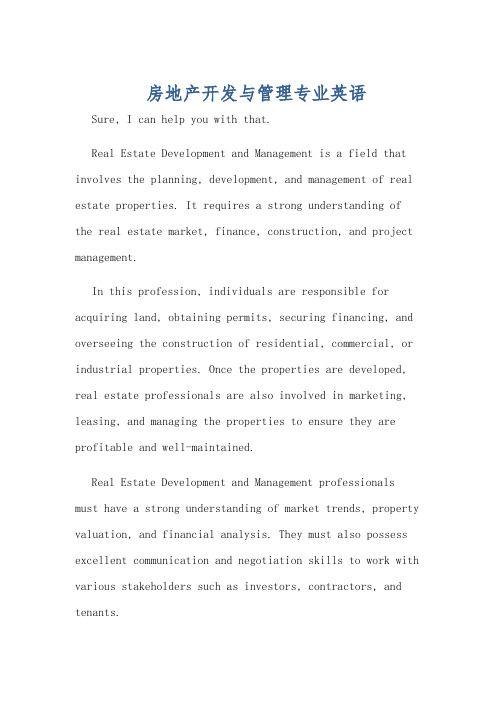
房地产开发与管理专业英语Sure, I can help you with that.Real Estate Development and Management is a field that involves the planning, development, and management of real estate properties. It requires a strong understanding of the real estate market, finance, construction, and project management.In this profession, individuals are responsible for acquiring land, obtaining permits, securing financing, and overseeing the construction of residential, commercial, or industrial properties. Once the properties are developed, real estate professionals are also involved in marketing, leasing, and managing the properties to ensure they are profitable and well-maintained.Real Estate Development and Management professionals must have a strong understanding of market trends, property valuation, and financial analysis. They must also possess excellent communication and negotiation skills to work with various stakeholders such as investors, contractors, and tenants.Furthermore, real estate professionals are also responsible for ensuring that their properties comply with local zoning and building codes, as well as environmental regulations. They must also stay updated on industry regulations and best practices to ensure the success of their projects.Overall, a successful career in Real Estate Development and Management requires a combination of strong analytical, financial, and interpersonal skills to navigate the complexities of the real estate industry.房地产开发与管理专业是涉及房地产规划、开发和管理的领域。
【房地产开发】【RealEstateDevelopment】

第 2 章 房地产开发项目可行性研究
教学内容:
2.1 概述
2.2 房地产市场调查与预测
2.3 房地产开发项目投资、成本、费用的估算
2.4 房地产开发项目收入估算与资金筹措
2.5 房地产开发项目经济评价
二、课程简介
本课程在简单介绍房地产开发流程、房地产行业资金来源、房地产开发用地取得的基础上着 重讲解房地产可行性研究报告和营销策划报告,并对学生的市场调研能力进行培养。该课程是学 生进入房地产开发企业的必修课程,可行性研究报告和营销策划报告的写作是本专业学生应掌握 的基本技能。
三、选课建议
大学四年级可选,需提前学习工程经济学。
教学内容:
4.1 投资与房地产投资
4.2 房地产开发资金筹集方式
4.3 金融机构对项目贷款的审查
4.4 房地产开发项目资金筹集规划
能力要求:
① 知道投资与房地产投资的概念、房地产开发资金筹措的方式; ② 理解金融机构对房地产贷款的审查程序。 第 5 章 房地产开发项目的规划设计及其评价
教学内容:
5.1 房地产开发项目的规划管理 5.2 居住区规划设计 5.3 居住区规划设计中的技术经济指标 5.4 房地产开发项目规划设计方案的评价 能力要求: ① 知道房地产规划设计的技术评价指标; ② 理解房地产开发项目规划设计方案的评价。 第 6 章 房地产开发项目营销策划书的编制 教学内容: 6.1 项目概况 6.2 市场调查 6.3 市场细分与目标市场的选择 6.4 产品定位 6.5 销售计划 6.6 市场推广 6.7 销售工作 6.8 销售后服务 能力要求: ① 知道房地产营销的概念、市场细分的方法、产品定位的方法; ② 理解租售工作和租售之后的服务工作; ③ 运用房地产市场推广的手段,撰写房地产营销策划报告。
房地产 英语作文
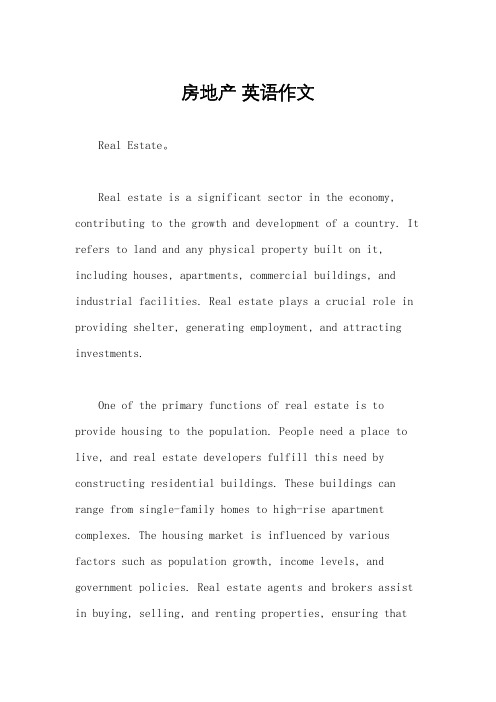
房地产英语作文Real Estate。
Real estate is a significant sector in the economy, contributing to the growth and development of a country. It refers to land and any physical property built on it, including houses, apartments, commercial buildings, and industrial facilities. Real estate plays a crucial role in providing shelter, generating employment, and attracting investments.One of the primary functions of real estate is to provide housing to the population. People need a place to live, and real estate developers fulfill this need by constructing residential buildings. These buildings can range from single-family homes to high-rise apartment complexes. The housing market is influenced by various factors such as population growth, income levels, and government policies. Real estate agents and brokers assist in buying, selling, and renting properties, ensuring thatindividuals find suitable homes.Apart from housing, real estate also encompasses commercial properties. These properties are used for business purposes, such as offices, retail stores, hotels, and restaurants. Commercial real estate is an essential component of the economy as it provides spaces for various industries to operate. The demand for commercial properties is influenced by economic factors, market trends, and location. Investors and businesses carefully analyze the potential of a commercial property before making any decisions.Real estate also includes industrial properties, such as factories, warehouses, and distribution centers. These properties are crucial for manufacturing and logistics operations. Industrial real estate is often located in areas with good transportation infrastructure to facilitate the movement of goods. Industrial properties are in high demand due to the growth of e-commerce and the need for efficient supply chains.The real estate sector has a significant impact on the economy. It creates employment opportunities in construction, property management, sales, and related industries. Real estate development stimulates economic growth by attracting investments and generating revenue. It also contributes to the tax base of a country, which can be used for infrastructure development and public services.However, the real estate market is subject to fluctuations. It can experience booms and busts, influenced by factors such as interest rates, economic conditions, and government policies. During a real estate boom, property prices rise rapidly, leading to speculation and investment. On the other hand, during a bust, property values decline, leading to financial challenges for homeowners and investors.Real estate also faces challenges related to sustainability and environmental impact. Construction and operation of buildings consume significant amounts of energy and resources. However, there is a growing emphasis on sustainable practices in the real estate industry.Developers are incorporating green building techniques, energy-efficient systems, and renewable energy sources to minimize environmental impact.In conclusion, real estate is a vital sector in the economy, providing housing, commercial spaces, and industrial properties. It contributes to economic growth, employment, and investment opportunities. However, it also faces challenges such as market fluctuations and environmental impact. The real estate industry must adapt to changing trends and embrace sustainable practices to ensure a sustainable future.。
- 1、下载文档前请自行甄别文档内容的完整性,平台不提供额外的编辑、内容补充、找答案等附加服务。
- 2、"仅部分预览"的文档,不可在线预览部分如存在完整性等问题,可反馈申请退款(可完整预览的文档不适用该条件!)。
- 3、如文档侵犯您的权益,请联系客服反馈,我们会尽快为您处理(人工客服工作时间:9:00-18:30)。
4.
1.Coakley, J. (1994). The integration of property and financial markets, Environment and Planning A 1994, 26, 697 -713
2.Logan, J. (1993). Cycles and Trends In The Globalization Of Real Estate, in P.L. Knox (ed), The Restless Urban Landscape, Englewood Cliffs: Prentice-Hall, 35-54
Many developers outside China mainlandentering the Shenzhen property market in 1990s,the management conceptsthey introducing have mademore and more developersin China Mainlandpay more attention to the enterprises’brand valueand raise thecompetitive.
3.
Globalization isnow increasing connectivity in many aspects of social and economic lives.Although, cannot be denied thepolicy oflocallymunicipal bureaucracy is much important for property development in Shenzhen. However,Integration of Property and Capital Markets, Organizational Change and Securitization of Real Estate Investment, these features proofreal estate becoming globalized istrue and irreversible.
Special Economic Zones in 1979, Shenzhenattractsenormousforeigncapitaltoinvest various industries forcity construction.Theend-user demandused todominate the property investments inthe 1980s and 1990sin Shenzhen, for example,manyindustrial properties (e.g. factory and warehouse)were builtinShekouof Shenzhendue to manufacturing demand.Butnow things seem to bechanging, for example, Shenzhen government decidetodevelopa new CBD inQianhai in Shenzhenin2009,over 70 companies from Fortune 500 have showed interest to set up offices in the district and 236 companies have registered in Qianhai,many offices properties were set up this yearsand face very high vacancy rates at this moment, end-user demand is not the primaryconsideration,long-term investment became the first priority of thedevelopersand investors.
2)Demand from the end-users cannot adequately explain the locational choice of property investment
Since the institution of the policy of“reform and opening”establishment of the
For example,Vanke, founded in Shenzhen in 1984,one of the biggestdevelopersinChina.After years of efforts, Vanke has gained a competitive edge in the housing industry. “Vanke” has become the first well-known trademark in the industry.
China International Trust and Investment Corporation(CITIC)Group, one ofthelargestdevelopersinChina,foundedCITIC Securities Co., Ltd.asafinancialsubsidiaryin 1999 in Shenzhen.It enable company have acloserrelationship withfinance industries. Also, CICTC runs other business like, construction, tunnels infrastructures, coal supply, etc, all of these business willhelp the company boost the revenue.
From the 2000s,real estate enters the fast development period in Shenzhen,more and morepeople find that the property is notjust acommodity, buying or selling the house isa good way to maximize investment income,exchange value in the occupier marketbecomesdominant to enable occupiers to trade upproperties,thespeculation in the Shenzhen housing marketare becoming increasingly common,for examplethewell-knownWenzhou-based property speculatorsappearedin Shenzhen at that time,result inhousing pricesboomandhighvacancy rates before the Financial Crisis or city in the south of Southern China’s Guangdong Province, theglobalizationof real estatehas caused some major changes in property market in Shenzhen, these are summarized as follow:
1.
Undeniably,globalization is a key trend in the business world today;many industries in the worldwereaffected by globalizationof our present era.Through the capital, information, goods andcultureexchange,maximum utilization ofthe global advantage,we could be able get a cheaper or better product than before, just like the production process of iPhone, total 31 countries play a rolein the creation of the iPhone 6.
1)Property Exchange valuein the occupier marketbecomes dominant
Coakley, J. (1994)arguesthe property as a use value and an exchange value as below:
The duality of property or real estate as both use and exchange value is more complex than in the case of many other commodities, partly because of its inherent nature and partly because of the increasing integration between property and financial markets.
